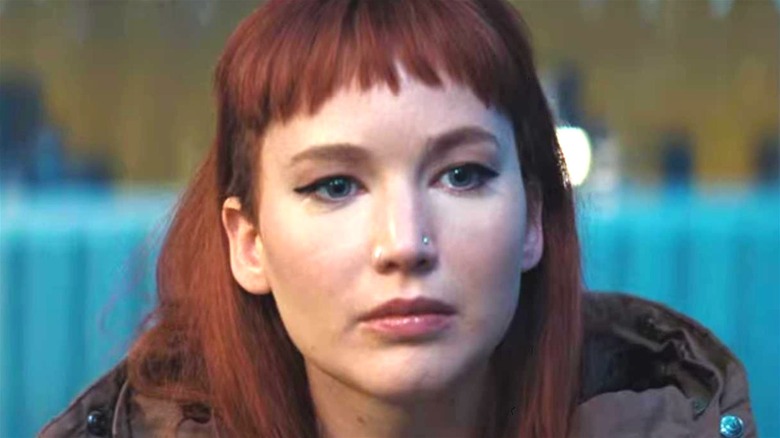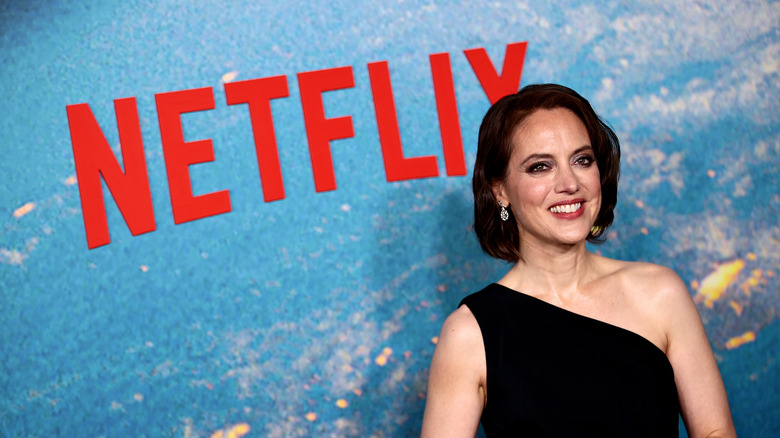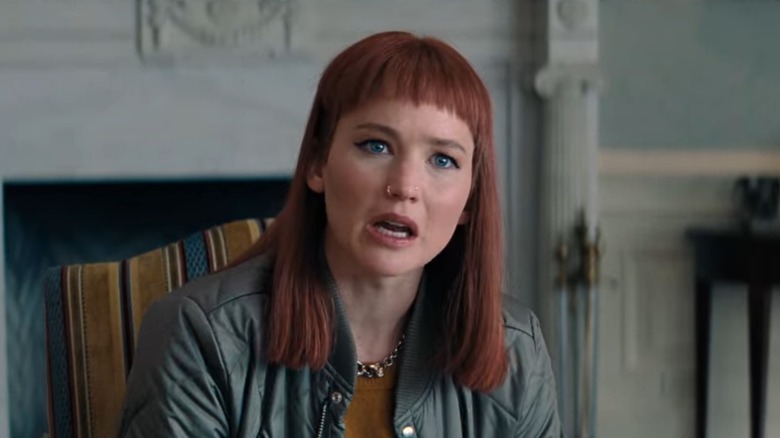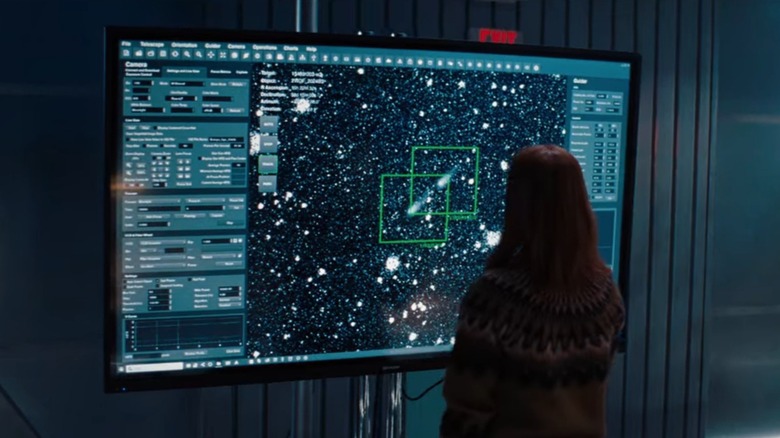Who Really Inspired Jennifer Lawrence's Character In Don't Look Up?
Amidst a star-studded ensemble cast, Ph.D. candidate Kate Dibiasky (Jennifer Lawrence) and Dr. Randall Mindy (Leonardo DiCaprio) are the heart of "Don't Look Up." After they discover a comet headed for a direct collision with Earth in just six months, the movie charts their journey from Hawaii's Mauna Kea Observatory to the White House to a small dinner party at the end of the world. Along the way, they're forced into an uncomfortable spotlight, under which they struggle to communicate the situation, and find themselves diverging in opposite directions as Randall becomes a media darling and Kate is derided and sidelined.
With so much of the narrative based in science and about scientists, director and screenwriter Adam McKay consulted Dr. Amy Mainzer, a professor in the Lunar and Planetary Lab at the University of Arizona — NASA describes her as "one of the world's leading scientists in asteroid detection and planetary defense." She weighed in on everything from the perspective of a scientist to the accuracy of the comet's depiction to the creation of Kate, who is Lawrence as we've never seen her before: With dyed red hair and short, blunt bangs, she's the perfect image of a cool young scientist.
Astronomer Dr. Amy Mainzer consulted with Jennifer Lawrence
While Kate Dibiaski was looking at supernovas for research on the expansion of the universe when she found the comet, Dr. Amy Mainzer is specifically in charge of monitoring asteroids and comets that are passing near Earth as the principal investigator of NASA's Near-Earth Object Wide-field Infrared Survey Explorer (NEOWISE).
When director Adam McKay wanted to consult a woman working in astronomy, he turned to Dr. Mainzer. She and Jennifer Lawrence discussed being a woman in a field dominated by men, considering things like, "What does it mean to be true to your own identity in all the different ways that that manifests?" and "How do you bring that to your profession?" After these discussions, Lawrence settled on a "fierce and notice me" vibe for Kate, she told Vanity Fair, and picked out the character's standout hair style with the film's hair department (per Pop Sugar).
While Kate's refusal to play along with the government and news as they make light of the comet is certainly one factor that sharply splits her and Randall's trajectories, there's another dimension to it: As a woman, she's disregarded, while Randall is listened to. It's a common occurrence in science, Mainzer said to Tudum, so she has a recurring joke about it: "We need to just bring a man. If we bring a man, maybe the problem will go away."
Mainzer singled out one scene in particular, in which the president (Meryl Streep) calls the comet Randall's discovery. Although Kate discovered it, and is sitting right there, he doesn't correct her. "I thought that little snippet there is really on point because, of course, that happens to lots of people in many different contexts, based on many different aspects of identity, not just gender," Mainzer said.
She coached the actors how to be scientists
Dr. Amy Mainzer helped both Jennifer Lawrence and Leonardo DiCaprio with the technical jargon in their dialogue and gave them insight into real scientists. "We had a lot of discussions about the culture of scientists, and those struggles we have when we try to communicate and [aren't] always successful at that," she said to Tudum, adding that scientists generally aren't trained in communication. In the movie, this manifests when Kate's justifiable bluntness isn't received well and Randall's nerves get him stuck in the mathematical details.
Ultimately, Mainzer wants "Don't Look Up" audiences to see that scientists are just humans, with strengths, flaws, and a deep love for nature. Maybe seeing that will build trust, she said. When discussing the role with DiCaprio, she told him: "You really have to speak for scientists. That's your job, to portray our fears, our frustrations, the love of the subject, and really all of the heart that we put into it." According to her, he "nailed it." As for Mainzer, she first got interested in astronomy when she was a nerdy little kid who opened an encyclopedia to learn more about Greek mythology and found a picture of the Andromeda galaxy.
She and Lawrence talked about all kinds of things to help with Kate's character, like a regular day in her life, what frustrates her, and, of course, snacks. "The snacks thing is absolutely on point," Mainzer said to Tudum, referencing Kate's propensity to talk about snacks. "We're a little bit obsessed with food in science, in general."
Mainzer was instrumental in the design of the comet
When she wasn't chatting with the actors, Dr. Amy Mainzer helped design a central part of the movie: the comet. It's modeled after one that her team discovered in March 2020, called Comet NEOWISE, a similarly large icy ball rocketing through space in Earth's vicinity. They picked a comet over an asteroid for the world-ending threat because comets pick up so much speed when they're hurtling in from the outer edge of the solar system.
Luckily for us, though, it's uncommon for rocks the size of Mount Everest to slam into Earth: "If huge extinction events were common, human life probably wouldn't be here on planet Earth," Mainzer said to Tudum. "The odds of us having survived long enough to have evolved would be slim, if these big impacts were happening regularly." Earth did take a heavy beating from asteroids, comets, and the like about four billion years ago, but now it's rare.
Mainzer presented PowerPoints to the effects team about how to make the Earth's demise look accurate at the end of the movie. Though it's certainly a size that'll be deadly for life on Earth, she said it's not going to ruin the planet's base structure: "The planet isn't going to explode like the Death Star blowing up Alderaan." What ended up in the movie is probably what the dinosaurs saw, she said. However, despite the catastrophic ending, Mainzer sees hope in "Don't Look Up," for how it shows that the fate of humanity is ultimately in our hands. "At its core," she said, "it is a very deeply felt movie about why it's important not to destroy the Earth." As the MCU's Starlord puts it: We should save the Earth because we're the idiots who live here.



